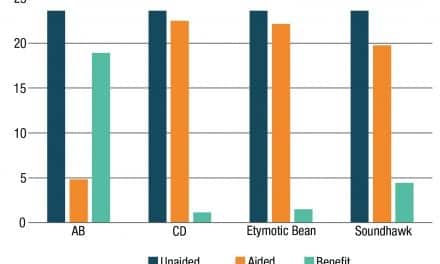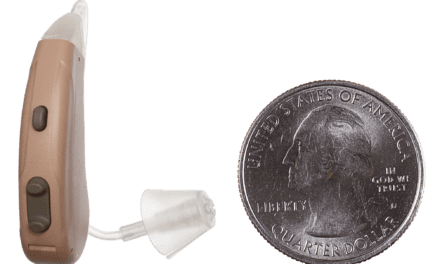Summary: A new study found that self-fitting OTC hearing aids provide equal long-term benefits to audiologist-fitted devices.
Takeaways:
- Cost-Effective Solution: OTC hearing aids offer a more affordable alternative, costing less than a quarter of traditional audiologist-fitted devices while providing similar long-term benefits, according to a recent study.
- Comparable Efficacy: Both OTC and audiologist-fitted hearing aids showed equal effectiveness for people with mild to moderate hearing loss over an eight-month period, as confirmed by the study published in JAMA.
- Increased Accessibility: The availability of OTC hearing aids has expanded access to hearing care, reducing the need for multiple audiologist visits and making it easier for more people to address their hearing loss.
A newly updated study conducted by researchers at the University of Colorado and the University of Pretoria (South Africa) finds self-fitting over-the-counter (OTC) hearing aids provide equal long-term benefit at a quarter of the cost of audiologist-fitted devices.
The study was published in the Journal of the American Medical Association (JAMA) – Otolaryngology–Head & Neck Surgery, confirming that for people with mild to moderate hearing loss, OTC continues to offer a more affordable and equally effective solution for hearing loss.
Comparing OTC and HCP-Fitted Hearing Aids
Researchers built upon an earlier study, also published in JAMA in April 2023, which found that self-fitted Lexie Lumen OTC hearing aids provided the same benefit for people with mild to moderate hearing loss after six weeks of use as those fitted by an audiologist. The updated research finds that users of OTC and audiologist-fitted hearing aids experienced equally similar benefits after eight months, further reinforcing the quality and value of OTC hearing products.
Over-the-counter hearing aids have widely expanded Americans’ access to hearing care, as they typically cost less than a quarter of the price of traditional, audiologist-fitted hearing aids, and can be purchased and fitted at home, saving wearers multiple trips to the audiologist for appointments that are often funded out of pocket.
Half of the participants in this trial were given Lexie Lumen hearing aids, which are commercially available online, at major retailers and every Walgreens across the U.S., and instructed to self-fit them as they would have if they purchased them from a retailer, the researchers say. The other half were given the same hearing aids fitted by an audiologist using the best-practice protocol when visiting an audiologist.
“The results of this study hold great promise for the tens of millions of Americans living with untreated mild to moderate hearing loss,” says De Wet Swanepoel, PhD, one of the study’s authors. “Hearing loss is chronically undertreated, in part because of the expense and inconvenience of prescription hearing aids. With clinical proof that OTC products produce the same long-term benefit, we believe more people can and will confidently take steps to address hearing loss so they can live longer, healthier lives.”
Further reading: Researchers Report OTC Hearing Aids Equivalent to Prescription
Hearing Aid Study Results
After the initial fitting, neither group was given access to additional audiological or remote support for fitting or fine-tuning. Following the initial two weeks, OTC wearers were provided ongoing access to Lexie remote support for fine tuning. Those with the audiologist-fitted hearing aids were able to access support and fine-tuning from an audiologist.
Within the first two weeks of the study, Lexie wearers wore their hearing aids longer and reported better outcomes than those using audiologist-fitted devices. After eight months, the benefits between self-fitted OTC hearing aids and audiologist-fitted hearing aids were comparable with no statistically significant difference.
“We are pleased to see that OTC hearing aids – particularly the Lexie Lumen – continue to perform well in randomized controlled trials against audiologist-fitted prescription products,” says Brian Maguire, senior VP for Lexie Hearing. “Broad access to affordable, quality hearing aids is essential to our mission to help everyone everywhere hear better.”
Availability of OTC Hearing Aids
FDA approved a new category of self-fitting hearing aids to be sold over-the-counter by retailers across the U.S. in 2022. The move has helped reinforce the importance of hearing health management and introduced more hearing care options to the tens of millions of American adults living with mild to moderate hearing loss.
Recent data show that about 44 million adults in the U.S. have hearing loss, but only a fraction seek the care they need. Experts say cost, access to audiologists and embarrassment are the biggest barriers to care. But hearing health has implications for physical, cognitive and mental health and should not be overlooked. Untreated hearing loss makes it hard to connect with family and friends, severely impacts quality of life and is correlated with higher instances of depression and dementia in older adults.
Photo: Dreamstime






So this study is assessing the SAME hearing aid, either self-fit or programmed by an Audiologist. No difference in performance. That could be due to the limitations on adjustment capabilities of the hearing aid. How about a comparison of OTC self fit hearing aids with true prescriptive hearing aids.
Yes, Roz makes a very good point about the need to compare using more than one type of hearing aid. And I guess that the success of self-fit will very much depend on an individual’s capacity to explore and persist. Another factor is the capability, patience, training level and sheer goodwill of the audiologist . Variable, naturally, and not easily assessed in advance by a layperson. It is certainly, too, a relationship thing.
Here in UK, NHS aids prescribed for people on average or starvation pay are not quite so good as the costly private ones, but can be excellent when carefully fitted. An option of fine tuning by the user might be welcomed, though probably not by all. .